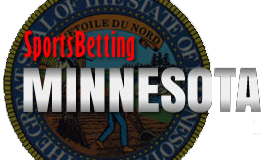Offshore Wagering And Underage Gambling The Main Concerns As Minnesota Considers Launching Sports Betting Regulatory Talks
 Minnesota has joined the fray of more than a dozen states looking to legalize and regulate sports betting within its borders, but concerns over underage gambling may tip the balance against wagering on sports.
Minnesota has joined the fray of more than a dozen states looking to legalize and regulate sports betting within its borders, but concerns over underage gambling may tip the balance against wagering on sports.
With a decision from the U.S. Supreme Court as to the constitutionality of a key federal anti-gambling law expected literally any day now, states around the country are diving headlong into the process of assembling legislation to legalize sports betting on their own. For his part, Minnesota state Rep. Pat Garofalo (R-Farmington) has been calling for Minnesota to put a legal framework to regulate sports betting in place since the middle of 2017 at the very least, and he is leading the fight to get a discussion started. However, with only about six weeks left until the May 21 sine die calls the 2018 legislative session in the Land of 10,000 Lakes to close and with lawmakers only just coming back to work Monday after of a weeklong break, the Gopher State could have its work cut out for it.
Garofalo, who chairs the state’s House Jobs and Energy Committee, has gone on record numerous times since then as saying the state of Minnesota needs to get its act together and pass a bill to provide a legal framework for regulating the sports betting industry. Sports betting could become legal nationwide in the event that the SCOTUS justices strike down the Professional and Amateur Sports Protection Act of 1992 (PASPA), which has for the last quarter century or so limited fully fledged sports betting to Nevada and to a lesser extent in Delaware, Oregon and Montana. The outspoken proponent for legalized Minnesota sports betting enjoined his colleagues in the statehouse to consider the potential fallout for the state if it has not prepared for what seems like the increasingly likely scenario of nationwide legality.
"If the Supreme Court removes the ban (on sports betting by declaring PASPA unconstitutional), and if we do nothing, the offshore sports books will flood social media and scoop up bettors who think they are regulated, legal and taxed (in America)," Garofalo told local reporters earlier in the week. "(What the Minnesota legislature does before May 21) will decide who gets to take billions in sports wagers and make tens of millions of dollars."
Simply put, the concern is that Minnesota will lose out and lose big in terms of investment, tax dollars and new jobs if its millions of sports fans (many of whom are regular bettors) continue to place their wagers at online sportsbook sites based in other countries that do not have overly restrictive gambling laws. These offshore sports betting sites are 100 percent legal in their own countries but are simultaneously outside the control of federal or state law and cannot be taxed, which is why so many American sports bettors take their hobby in that direction. Garofalo’s fears are not unjustified, as the vast bulk of the American sports betting market (which is valued fairly conservatively, believe it or not, at somewhere between $150 billion and $250 billion annually) is actually at these offshore sportsbook websites and not at casino-based ‘books on the Las Vegas Strip.
Then there is the main sticking point of sports betting opponents to consider, that issue of course being the specter of underage gambling run rampant. Underage and problem gambling dovetails with the rise of the internet as the primary vector for the spread of sports gambling to overseas operators, but the real threat, opposition groups and reluctant politicians say, is in the area of mobile sports betting. Millennials and Gen Zers, as any casual observer can easily see, are practically welded to their mobile devices like smartphones and tablets, and the ready access to high speed streaming data and wireless internet (to say nothing of the tech savvy of younger generations) makes enforcing existing gambling laws hard enough.
The fear is that newly empowered legal sports betting operations and offshore sportsbook operators alike would begin more aggressively pursuing the patronage of younger players, whether or not they are legally of age to place wagers in the North Star State. Northstar Problem Gambling Alliance Executive Director Cathie Perrault told reporters over the legislative break that her organization has been conducting research into the matter, concluding that the younger a player starts betting on sports the more likely that person is to lose their ability to discern the difference between a hobby and permanent lifestyle fixture. While the Northstar Problem Gambling Alliance does not explicitly oppose sports betting expansion in Minnesota, the group does not by any means endorse broader legalization either, least of all without a “proper regulatory regime” being in place.
“There needs to be consumer protection systems that ensure people receive messaging about the potential for gambling problems, how to get help, and making sure underage players aren’t going to play,” she said in a media release prior to the return of lawmakers to the statehouse early next week.
Other advocacy groups are not so measured in their concern about the legalization of sports betting in the Gopher State. The aptly named Citizens Against Gambling Expansion issued a statement around the same time to the effect that it categorically opposed any sports betting legislation coming out of Saint Paul, with fears over underage players getting access and getting hooked being the primary cause for concern. The group has said it will “fight [sports betting regulatory legislation] strongly at the Capitol,” calling the nationwide move to enact laws legalizing the practice “one of the largest expansions of gambling in state history.”
Another factor looming large over even the decision as to whether or not the state of Minnesota should have a conversation at the legislative level about getting involved in the sports betting business like some of its neighboring states are the various business interests that have to be considered. True, there are potentially tens of millions of dollars in annual taxable revenues that sportsbooks that the various states interested in this sort of venture could hope to get out of a regulated sports wagering industry, but if there are too many fees and taxes it will definitely not go over with the casino operators. Then there are the concessions asked for (or really more like demanded) in exchange for their support of sports betting legislation – things like “integrity fees” are just rents the bookies are being asked to pay out to the leagues, which the operators also won’t like a bit.
For what it’s worth, the professional sports leagues, in Minnesota and almost a dozen other states headed up by the combined lobbying efforts of the National Basketball Association and Major League Baseball, have reversed their longstanding stance on sports betting and now support legalization. Call it reading the writing on the wall, but the leagues have rightly recognized that sports betting – especially when conducted online – is here to stay and they cannot stop it, so (the thinking goes) they might as well try to glean a little extra profit from it. Hence, the leagues and their lobbyists are asking for things such as unrestricted control over the data collected from bettors and the aforementioned integrity fees, which amount to a 1 percent cut of all betting handle collected by the sportsbooks in every state (which equates to roughly 20 percent of gross revenues).
The leagues, of which the NBA is the most vocal nowadays, sent their janissaries to testify before the Missouri legislature advocating for sports betting laws that will best represent their wishes. Basically, the premise of integrity fees and all that control over the data gathered and tabulated on bettors participating in sports wagering, according to the leagues, is so that the leagues can better guarantee cheating is being kept out of pro sports. A tight hand is needed in this age of deregulated sports betting taking place online, which they leagues ominously refer to as a “black market” if it isn’t happening in Nevada.
Pablum like that may be difficult to swallow, as Missouri, Kansas, West Virginia and New York, among other states, have shown, as all are fighting or did fight against those controls to one degree or another. Another group of stakeholders – the casino operators themselves – have concerns that are more difficult to overlook. In the Land of 10,000 Lakes, all the state’s riverboat casino operation are run by tribal gaming organizations, and their clout in the state cannot be overestimated, and, in the eyes of key Minnesota lawmakers, sticking to what is good for the tribes that will be overseeing sports betting is “nonnegotiable.”
“I won’t submit a sports gambling bill the tribal casinos are opposed to,” Rep. Garofalo said to reporters earlier in the week.
That is encouraging, as the surfeit of possible fees that other states are considering levying against sports betting operators (not to mention the integrity fees the sports leagues want to get for the “use” of their product by sportsbooks) could prove quite burdensome for those same operators. If worst came to worst and all the possible fees and taxes were imposed on sportsbooks then it is incredibly likely that these overhead costs would have to be offset somewhat by passing that burden along to players themselves. And what, pray tell, would drive sports bettors into the arms of so called “black market” overseas sports betting sites faster than lower than average payouts and sign up fees?
If states like Minnesota are to go forward with passing laws to legalize and regulate sports betting in their jurisdictions they absolutely have to weigh the cost of several issues from consumer protections to security to crafting sensible tax plans and simply taking care of their businesses. It is possible for everybody to win by legalizing sports betting in Minnesota and elsewhere in the country, but lawmakers are going to have put in the work to make it happen. And in the case of Minnesota’s legislature, they only have about six weeks to do it because there hasn’t even been a single prospective bill prepped for committee consideration yet.
While SportsBettingMinnesota.com knows it’s true that this not a great foundation for making a sports betting law than can really stick, but at least everyone involves seems to have the right intention. It is also true that Minnesota’s lawmakers have all the puzzle pieces laid out in front of them, with plenty of good feedback from the various interested parties and stakeholders, as well as plenty of precedents from other states that have already successfully passed sports betting legislation of their own. Now it just remains to see if legislators in the Gopher State can actually put the puzzle together in time for sine die.
| Best Minnesota Sports Betting Sites - 100% Trusted + Safe |



